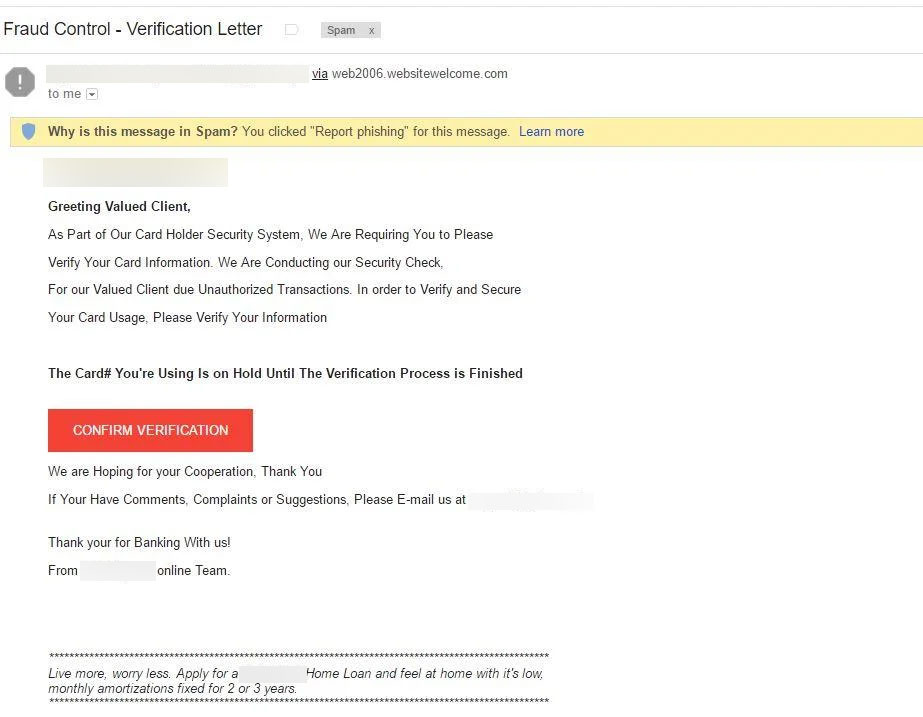Scammers are getting more clever each day. But you can still prevent them from harming you by understanding all the online scams in the Philippines and following the numerous ways to protect yourself online.
Phishing

Phishing started in the late 90s until the early 2000s when hackers sent emails to individuals, imitating bank accounts or official statements.
The purpose of these emails would be to hook the individuals into sharing their passwords or other personal details.
This gives the hacker access to accounts that use these passwords and details, possibly stealing money or social media accounts from the original owner.
How to recognize phishing scams:
- Check the email’s sender. Make sure that the email used is the official email. Hackers typically have random numbers in the email or use a public domain (Hotmail, Gmail, Yahoo).
Tip: Inspect links in emails you receive. You can hover over the link to see if the destination link is a legitimate site. - Phishing emails ask for your passwords and personal details. Official companies or accounts will never ask for these over email, phone calls, or SMS.
- The email tells you to click a link to proceed.
- The email offers free items, coupons, or winnings you’ve never participated in.
For your safety, avoid giving your personal information, including your OTP, birthdate, addresses, etc.
Practice changing your passwords regularly as well.
Wangiri
The scam is a Japanese word meaning “one ring and cut,” which means precisely that.
Wangiri is a telephone scam that lets hackers steal money from users depending on how long they stay on the line.
The scam starts with an unknown number calling you, usually from overseas.
They will purposely leave a missed call, prompting the users to call back.
The call is then re-routed to an expensive network that’ll cost you money for scammers to earn.
There are also Wangiri scams that can use local numbers, then re-routing to overseas networks.
Some won’t leave missed calls and wait for you to answer, then come up with a narrative that lets you stay on the line.
How to avoid Wangiri scams
- Do not answer calls from unknown numbers
- Avoid sharing or posting your phone number online
- Be aware of the numbers that scammers usually use for scams
- Never return missed calls from numbers you do not recognize
Scammers are getting craftier, but you need to remain aware of the methods they are currently utilizing.
Report any strange-looking numbers to authorities and block these numbers as fast as you can.
Vishing
Another form of phone scam is when hackers imitate official calls to gather the personal information of a potential victim.
Skilled hackers use convincing phrasings to prompt individuals to release passwords, OTPs, and even their full names and addresses for malicious gain.
There are reports where some vishing scammers would sometimes formulate a scenario, such as an accident, to get individuals’ attention.
Other times, hackers will threaten people for information. Vishing can be a terrifying experience, especially since you’re directly communicating with the hackers.
How to avoid Vishing scams
- Avoid answering calls from unverified and unknown numbers
- Never share personal information over phone calls or texts
- Recognize that official calls from banks, or other companies, will never ask for passwords or OTPs
- Steer clear from agreeing to any ransom deals
- Take note of the number and report it immediately to the authorities
Smishing

Smishing combines the words “SMS” and “Phishing.” Instead of emails or online platforms, hackers would fish for your information using text messages.
This scam is the most common form of hacking in recent weeks, as many have received daily texts from different numbers.
Smishing isn’t easily blocked or sent to “spam” like emails, and it’s easy for others to be fooled because of the personal-sounding messages.
In addition, some hackers have also been using individuals’ names and even official company names.
While these may seem frightening, you can still protect yourself and avoid falling for the hacker’s messages.
How to recognize smishing scams
- Smishing messages include unverified links in the body.
- Hackers would tell you about a job application, bank notice, loans, promos, or even raffle prizes while asking for your personal information.
- New numbers who are imitating someone you know personally asking for some cash.
- Texts would also imitate official companies to ask for your passwords. These attackers would usually say that your account has been compromised. Then the scammers will tell you that your password is required to make your account secure again.
Once you are familiar with the patterns of Smishing scams, it will be easier to recognize these hackers to avoid any incidents.
You can read here for more tips to prevent getting scammed. Let’s help lessen the number of victims by sharing the info with friends and family.
Best Tips to Stay Safe Online and Avoid Getting Scammed
You can also follow some of these safe practices to protect your privacy, such as enabling multi-factor authentication (MFA) in important accounts or using VPNs.
Here are some more tips to keep in mind to avoid getting scammed:
- Only transact with people you know or verified sites
- Never click links without verifying their authenticity
- Do not enter or give out your personal information, whether it’s through SMS, Email, or Voice Calls
- Block and delete the emails and numbers you’ve identified as scams
- Practice good password hygiene by always having solid passwords across your accounts. A strong password is usually a combination of upper and lower-case letters, numbers, and special characters. Change your password regularly.
SMART has partnered with law enforcement agencies to lessen the number of scammers online.
Smart coordinates with groups such as the Philippine National Police to launch investigations against those sending smishing texts.
The facts uncovered will help the groups find ways to prevent more victims and decrease the incoming smishing texts.
In an additional effort, SMART has clickable links in text messages and has doubled its security to recognize spam while continuously spreading public awareness to its users.
If you’re still receiving smishing messages, you can file a report to the NTC here or send it to cybersecurityincidents@smart.com.ph.




